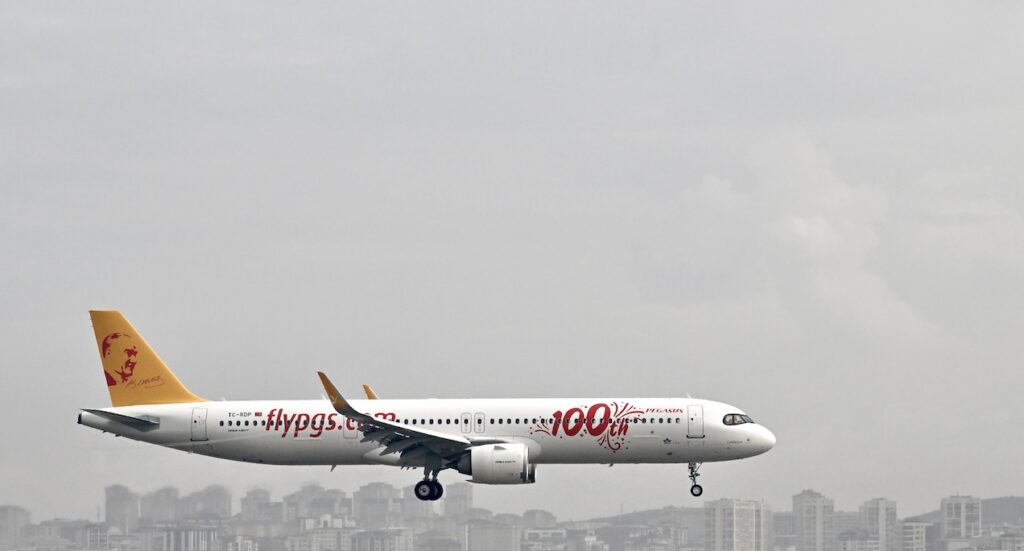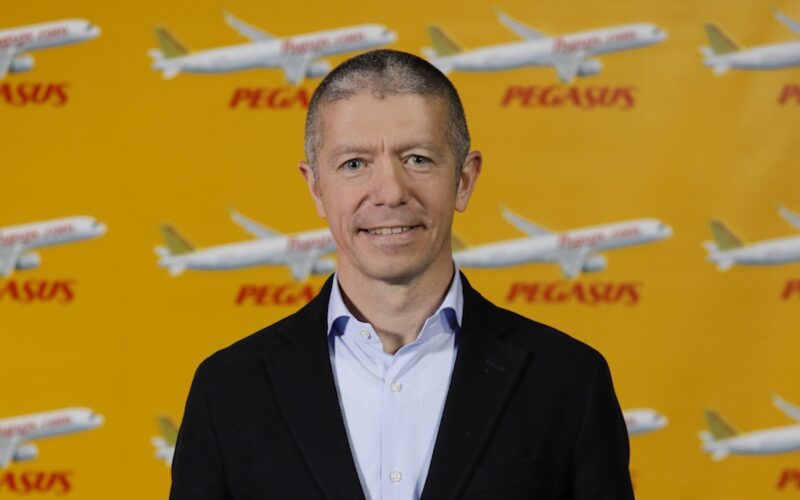It’s proved to be an eventful year for Pegasus Airlines.
So far in 2023, the Istanbul-based carrier has posted record financial results, seen its credit rating upgraded, received its 100th aircraft and placed additional aircraft orders that will bring its Airbus fleet up to the 150 aircraft mark. It has even launched a technology innovation lab in Silicon Valley to take the pulse of the latest travel tech developments.
All of this highlights the growing confidence with which the largest privately-owned Turkish airline views the future.
Earlier this quarter, AeroTime had the chance to sit down with Pegasus Airlines’ Chief Commercial Officer Onur Dedeköylü to talk about the carrier’s performance and its plans for further growth.
Dedeköylü certainly has good reason to feel satisfied. In March 2023 Pegasus Airlines posted strong financial results for the previous year, indicating total post-pandemic recovery. The three first quarters of 2023 have confirmed this upwards trajectory.
Dedeköylü said: “Our EBITDA margin was the highest in the world [of any airline] in 2022. In terms of ancillaries, of share of ancillaries over total revenue, we are in the top ten globally, and in terms of fleet utilization and other factors, we are also one of the best airlines in the world. So, we are performing pretty well.”
Cost discipline is one key reason for this, but there are others.
“We see ourselves as a low-cost airline. We are a hard-core low-cost airline, actually. If you look at our cost base, we have the lowest ex-fuel cask in the world – number one in the world,” the executive explained.
Pegasus follows the low-cost airline rulebook, but with a major difference: it offers connecting flights through its hub at Istanbul Sabiha Gökçen International Airport (SAW).
“The one way that we differ from the typical low-cost airline model is that we do transit business. That’s because we are based in Turkey, which is located at the crossroads of Asia, North Africa and Europe. 20% of our ASKs are in Turkey and the other 80% is international operations,” Dedeköylü clarified.
Elaborating further on the composition of this traffic, he added: “50% is from Europe, 30% from CIS (Community of Independent States), Middle East and North Africa.”
He continued: “We are continuously developing and growing this network. We aim to increase point-to-point traffic going into Turkey but also to our transit traffic, to take advantage of our geographical location. We call ourselves a network low-cost airline.”
At present, 25% of Pegasus’s passengers are connecting, quite a remarkable figure for a low-cost airline, with this percentage climbing to 32% in the case of international traffic.
Dedeköylü admitted that all this growth is putting some capacity pressure on the current infrastructure at Sabiha Gökçen airport.
Consequently the airport will see its capacity expanded with a second runway expected to open shortly, but the bottleneck at the terminal will remain.
“On peak summer days, especially at weekends, the terminal is packed, and bringing in more people on peak days is not doing any favors for the passengers or the airlines. We are talking to the authorities because we need another terminal to be constructed as soon as possible,” Dedeköylü said.

In the meantime, Pegasus is also expanding in other Turkish cities, particularly Antalya, one of the gateways to the so-called ‘Turkish Riviera’.
“Antalya (AYT) is a growth base for us, we have significantly increased our presence there. We based seven aircraft there in 2018, this year we have 18 aircraft,” Dedeköylü explained. “We are already one of the top three airlines operating in Antalya, whereas we were hardly in the top five before the pandemic.”
He added: “We are still very focused on growing at Sabiha Gökçen (SAW). The other bases we grow on a tactical basis – maybe we can base three or four aircraft here or there – but strategically, we see our growth bases at Sabiha Gökçen and Antalya airports.”
Dedeköylü also shared some thoughts about the carrier’s fleet evolution and the additional 36-aircraft order Pegasus has placed with Airbus.
“We ordered 100 aircraft in 2012 and then we extended it to get another 50 aircraft – so, the whole order will be 150 aircraft,” he said. “We still have 78 of these awaiting delivery and all of them are going to be A321neos. 108 of the 150 are going to be A321neos and we will already have 41 of them by the end of this year.”
Dedeköylü went on to praise the performance of this aircraft type.
“It is very important for its contribution to sustainability, revenue and profitability thanks to its fuel efficiency,” he said. “Having three quarters of our fleet made of neos gives us a clear cost advantage, despite the fuel prices.”
Pegasus continues to operate some legacy Boeing 737-800s.
“The 737s are now in the fleet and we are in discussion about how long to keep them, but of course, the strategy is definitely to move towards a single aircraft type,” Dedeköylü said.
Dedeköylü also shared his optimism about the future.
“The demand is there. It’s not the so-called post-pandemic ‘revenge travel’ that we’re seeing, but rather strong, sustainable demand,” he said. “This is despite all the challenges, inflation and strong competition from other Turkish carriers, such as Turkish Airlines and Anadolujet [a Turkish Airlines subsidiary recently rebranded as AJet – ed. note]. Passenger demand is there and revenue-wise is even better. Revenue in the first half of the year was 42% more than the preceding one. Our yields are strong, already €26 per passenger higher than in 2019.”
In case there was any doubt about where Pegasus intends to focus its energies next, Dedeköylü stated: “We have a strategy to grow more internationally. We plan to increase our international capacity.”
“All of this helps with revenue,” he added. “I expect us to end the year as one of the top airlines.”

